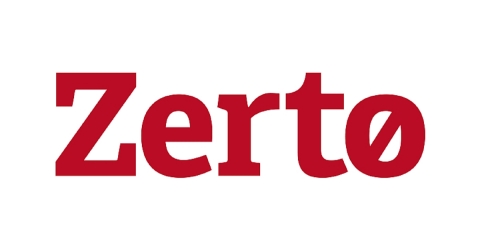Zerto Unlocks Continuous Cloud Protection with New Data Protection Solutions for AWS Workloads
Zerto Unlocks Continuous Cloud Protection with New Data Protection Solutions for AWS Workloads
Modern backup and disaster recovery for hybrid and native AWS deployments
BOSTON--(BUSINESS WIRE)--Zerto, an industry leader in cloud data management and protection, opened its annual ZertoCON event with the announcement of new data protection solutions for Amazon Web Services (AWS) workloads. From backup and disaster recovery (DR) for Amazon Elastic Kubernetes Services (Amazon EKS), disaster recovery across AWS Regions or Availability Zones, and new backup capabilities for AWS focused on cost optimization and security to safeguard companies from malicious intent.
Zerto backup and disaster recovery for Amazon EKS is a new offering that integrates backup and disaster recovery into the application deployment lifecycle for Amazon EKS. Organizations can now easily protect, recover, and move any Kubernetes application and its persistent data for a native, data protection as code experience.
In addition, Zerto now offers disaster recovery across AWS Regions and Availability Zones, at scale. This new Zerto offering is designed to protect large scale native AWS applications for Amazon Elastic Compute Cloud (Amazon EC2) data. Today, organizations hit limits when trying to replicate thousands of instances across AWS Regions. This challenge results in increased Recovery Point Objectives (RPO) and Recovery Time Objectives (RTO). Zerto’s approach for in-cloud replication will solve this issue by utilizing techniques which improve volume replication concurrency across regions, utilization of data APIs which reduce reads and writes and optimization of the overall orchestration workflows to allow for low RPOs and RTOs of minutes without use of agents.
Available now in beta, the Zerto Platform delivers disaster recovery capabilities that are simple to deploy, easy to use, and automates the orchestration of failover and failover testing across AWS Regions and Availability Zones. Customers with production applications running in AWS, such as SAP or Oracle, can now failover between AWS Regions or Availability Zones and be assured that the application is maintained in a consistent manner and recovered as one consistent entity.
Also announced on the first day of ZertoCON, Zerto 9.0 introduces new backup capabilities for AWS focused on cost optimization and security that include new cloud tiering into Amazon Simple Storage Service (Amazon S3) Glacier for cost-effective storage and new immutability for backups to AWS. Immutability safeguards cloud backups from malicious deletion or encryption of data through ransomware.
“The availability of continuous data protection for AWS workloads is an important step for organizations who want to safeguard their data wherever it is used across this market-leading set of cloud services,” commented Gil Levonai, CMO and Senior Vice President of product, Zerto. “In doing so, Zerto and AWS customers can build cloud-native solutions and infrastructure, underpinned by a single solution that delivers data protection, recovery, and migration of data to and across AWS.”
ZertoCON 2021 Virtual is focused on enabling organizations to ‘Unlock Continuous Cloud Protection’ across disaster recovery, backup, and cloud migrations to easily accelerate their cloud journey. This year’s event will help attendees understand how to simplify management and protection of cloud workloads, all while quickly recovering from ransomware attacks and other disruptions that could impact data and cause downtime.
To learn more, go to the ZertoCON 2021 Virtual page to access all sessions.
About Zerto
Zerto helps customers accelerate IT transformation through a single, scalable platform for cloud data management and protection. Built for enterprise scale, Zerto’s simple, software-only platform uses continuous data protection to converge disaster recovery, backup, and data mobility and eliminate the risks and complexity of modernization and cloud adoption. Zerto enables an always-on customer experience by simplifying the protection, recovery, and mobility of applications and data across private, public, and hybrid clouds. Zerto is trusted by over 9,500 customers globally and is powering offerings for Microsoft Azure, IBM Cloud, AWS, Google Cloud, Oracle Cloud, and more than 450 managed service providers.
Contacts
Derrick Shannon
Touchdown PR
Zerto@touchdownpr.com
772.475.1027
